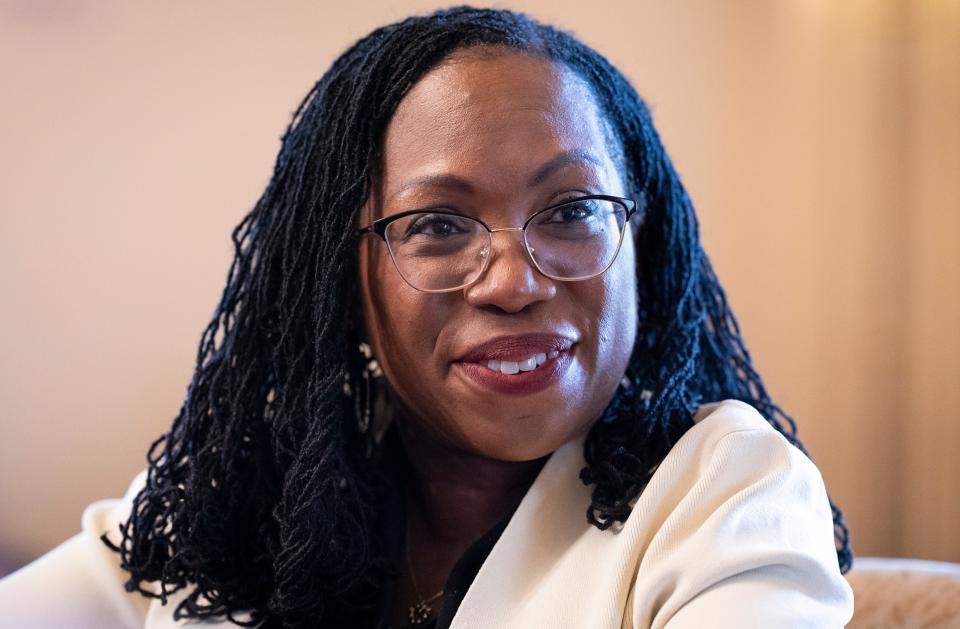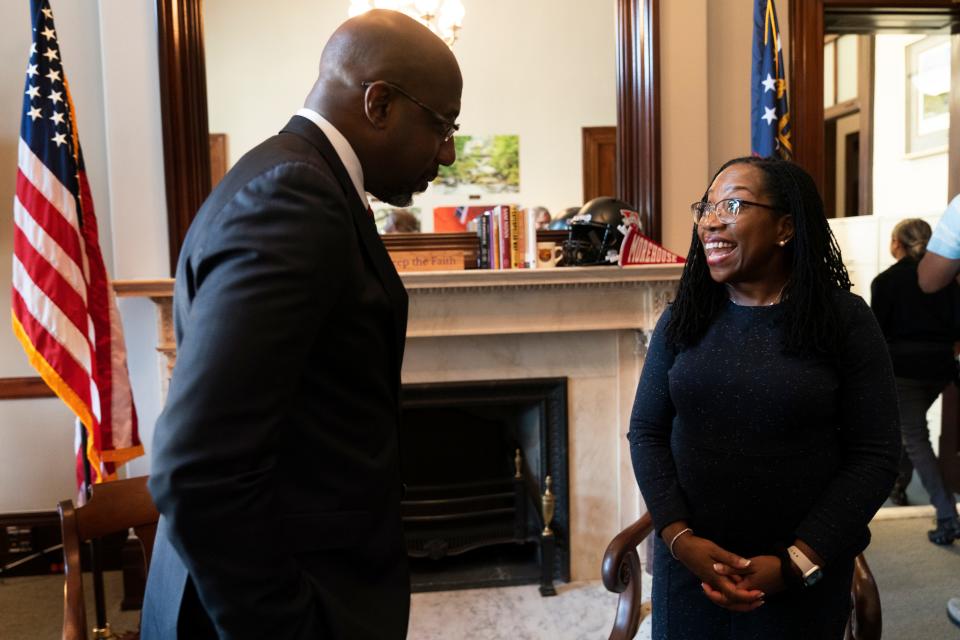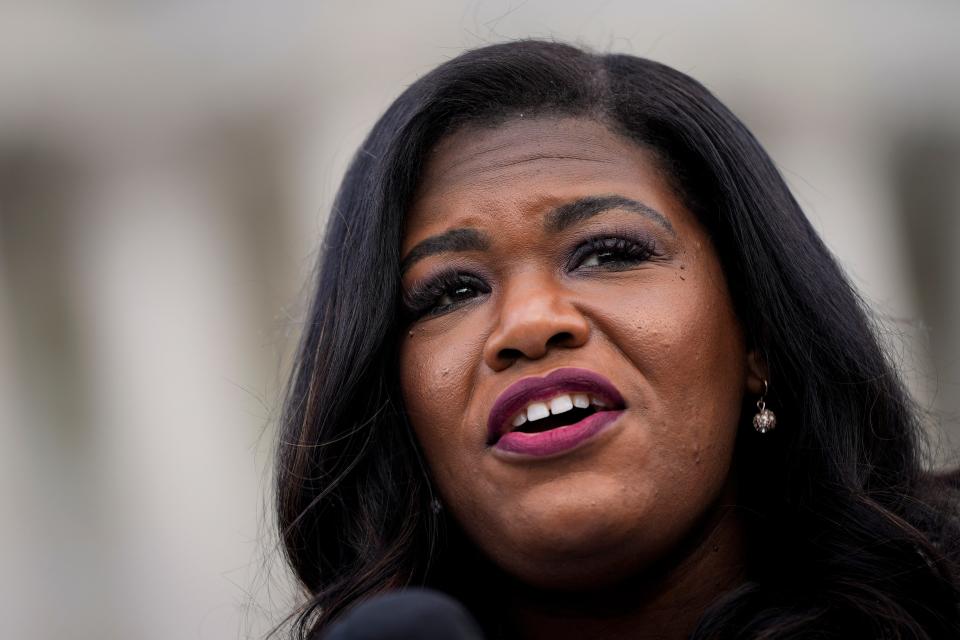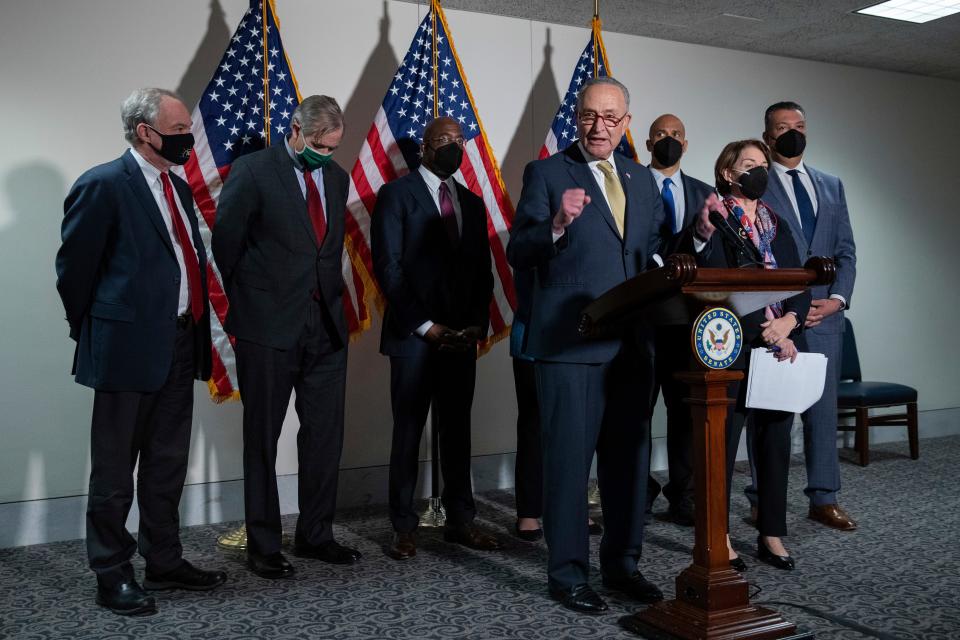'The only one in the room': Judge Jackson's Supreme Court hearings spotlight lack of Black women in the Senate
WASHINGTON – The historic confirmation hearings for Judge Ketanji Brown Jackson's nomination to the Supreme Court kick off Monday morning. They will last four days, during which the 22 Senate Judiciary committee members will scrutinize and dissect Jackson's character and record. That will be followed by a vote on her confirmation by all 100 senators.
But nobody questioning Jackson or voting on her appointment will look like her. If confirmed, she will be the first Black woman to serve on the Supreme Court.
The Senate has no Black women. The only possible opportunity for a Black woman to vote on the historic nomination is if Vice President Kamala Harris is called on to provide a tie-breaking vote.
Jackson's nomination has shed light not only on the absence of Black women on the high court, but also in Congress' upper chamber. Harris served in the Senate until she was sworn in as the first woman, first African American, and Asian American vice president in 2021. The only other Black woman to serve in the Senate – Democrat Carol Moseley Braun of Illinois – served a single term from 1993 to 1999. Both former senators were members of the Judiciary Committee.

More: For Black women judges like Jackson, blazing a trail has meant opportunity, scrutiny
That could change come November.
Four Black women are running for Senate this year. Former state Supreme Court Chief Justice Cheri Beasley in North Carolina, current Rep. Val Demings in Florida, and attorney Morgan Harper in Ohio make up the Democratic field. On the GOP front, veteran Kathy Barnette is running in the Pennsylvania primary, but has not garnered the same attention or support as the frontrunners in that race.
The Black women running for Senate
While Harper still faces a competitive primary, Beasley and Demings are running as the odds-on favorites to win their nominations and advance to the November election, a major accomplishment in two of the top Democratic battlegrounds for seats now held by Republicans.
More: Pennsylvania, Arizona, Alabama: the Senate primary races to watch in 2022
"I don't think that we can underestimate the fact that they have cleared the field already, that is monumental," said Stefanie Brown James, co-founder of The Collective PAC, an organization working to elect Black candidates.
Brown James argues the fact that the candidates have done so is especially notable because a lack of generational wealth networks makes it harder for Black candidates to raise sufficient campaign funding, and because Black candidates are often not as embedded in the state or local political party structure.
"Black voters, Black women especially, understand what’s at stake in this upcoming election," Jessica Knight Henry, the Democratic Senatorial Campaign Committee's chief diversity and inclusion officer, told USA Today. "They are the core of the Democratic Party and a crucial group for our success in the general election."
"Candidates who can communicate effectively with voters and work to solve the unique issues facing communities of color are critical to protecting and expanding Democrats’ Senate majority," she said.
The fact that there are no Black women in the entire Senate to vote on Jackson's nomination isn't lost on the Black women running for a seat in the chamber.
"The diversity of perspectives that she will bring to the court is important, just like the diversity of perspectives that a diverse Senate brings is important," Demings said in an interview with USA Today.
In a statement, Beasley said "Representation matters – and from the state legislature to the Supreme Court to the U.S. Senate, we are all better served when our institutions reflect the diversity and experiences of our nation."
Beasley was the first African American woman to serve as Chief Justice of the North Carolina Supreme Court. Her campaign did not make her available for an interview despite repeated requests. Citing Beasley's busy schedule, her campaign instead provided a written statement.
Jackson's confirmation hearing highlights greater lack of diversity
"The fact that we're going to have this historic nomination and choice made by one of the most preeminent bodies in the country, and there will be no black woman to raise her vote for this Black woman to be our next Supreme Court justice is really a travesty," Brown James said.
More: Review of Supreme Court nominee Ketanji Brown Jackson's opinions shows outcomes cut both ways
"There is a link between us as Black women in this country, in our lived experience. For that perspective to not be raised in the questioning is definitely something that's missing," she added.

Supporters of Jackson fear that her identity as a Black woman will lead to undue attacks and criticism during the hearing.
Last month, a group of 14 Black Congresswomen including Congressional Black Caucus chairwoman Rep. Joyce Beatty, D-Ohio, wrote a public letter to President Joe Biden commending him for pledging to nominate a Black woman to the Supreme Court as critics accused the president of implementing a "quota" system.

Rep. Cori Bush, D-Mo., led the response. On Thursday, Bush told reporters that she and the rest of the Congressional Black Caucus have been looking into potential lines of attack on Jackson and planning how to best promote her nomination.
"We plan to support her on social media, in person, however we can be there for her," Bush said.
The need for Black representation in the Senate is underscored by the confirmation process, members say, but extends far beyond this week's proceedings.
More: What's next for Supreme Court nominee Ketanji Brown Jackson? A high-profile confirmation process
"The Senate certainly does not suffer from too much diversity," Sen. Raphael Warnock, D-Ga., told USA Today.
"I think we need diversity in all levels of our government and that the people are well served by people who bring both the depth of experience and expertise, but also perspective," said Warnock, one of only three sitting Black senators. "I'm grateful that we have an opportunity in this historic moment."

"I think things are lost by us not having diversity in the United States Senate," said Democratic Sen. Cory Booker of New Jersey, who is currently the only Black member on the Senate Judiciary Committee. As a member of the committee, he will be able to question Jackson during the hearing.
More: What's next for Supreme Court nominee Ketanji Brown Jackson? A high-profile confirmation process
The only Black woman in the room
"When you have Judge Jackson go before the U.S. Senate, in the committee conversations, there's no one in the room that's asking her the questions that she can look into her eyes and say 'sis, I see you seeing me,' and just have that feeling of not being the only one in the room, and I think we undervalue what that presence means to us," Brown James said. "I think that's a tremendous loss for this circumstance right now."
More: Supreme Court fight shows why Americans have such a hard time talking about equity for Black women
"The bottom line is, I've been the only woman or Black woman in the room on many occasions," Demings said, referencing her experience as Orlando's first female police chief.
She emphasized how her background would inform her work if she is able to defeat incumbent GOP Sen. Marco Rubio in November.
"I grew up for Black and female in the South," Demings said. "I remember being told by vicious people as a child, that I wasn't the right color. I wasn't the right gender, I probably would amount to nothing."
More: 'It's time': Black women rally for Supreme Court nominee Ketanji Brown Jackson in Washington
"I will be a senator with all of the rights and privileges of the other 99 U.S. senators, but I will bring my experiences and my perspective as a woman, and as a Black woman," she said.
"Whether I'm there alone – I pray I am not, because I am rooting and pulling for Cheri Beasley – or not, I will get to the Senate, take my oath to heart, and do my job to make the world a better place and level the playing field for people who are willing to work hard and play by the rules and deserve a fair shot, like Judge Brown Jackson," Demings added.
Demings said that she and Beasley have been in contact throughout their campaigns and have compared their experiences.
"We do believe there is a seat at the table for both of us," she said.
This article originally appeared on USA TODAY: Supreme Court: Jackson hearing shows lack of Black women senators

